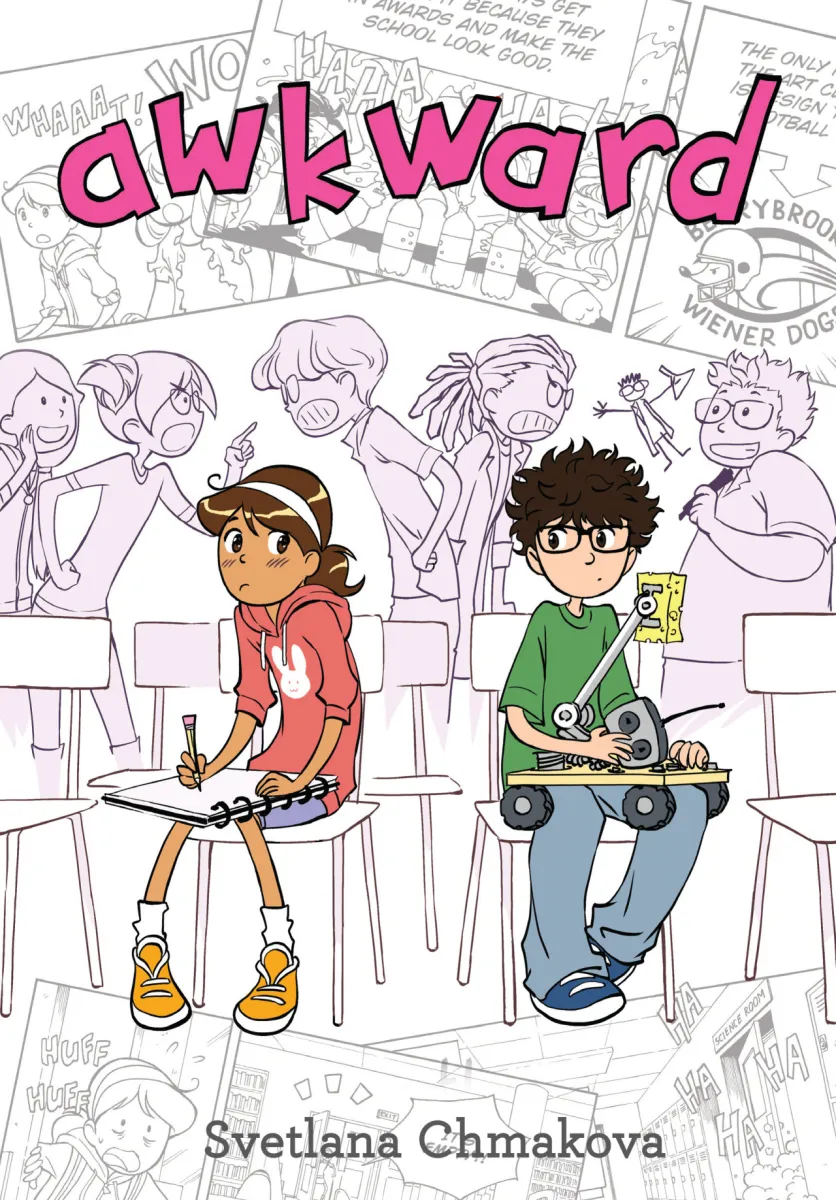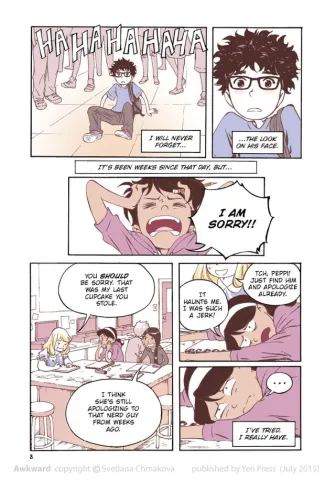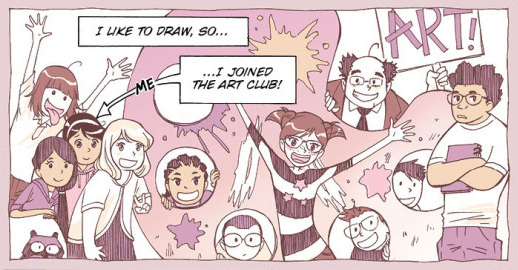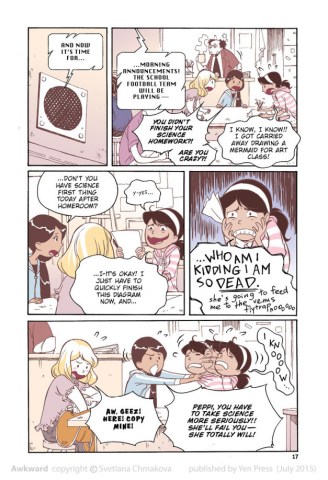If you know nothing else about Svetlana Chmakova’s Awkward, know this: it needs to be on the shelves of every school and public library. That may sound bombastic, but Awkward deserves the high praise. It’s one of the best reads I’ve had—comic or otherwise—in years.
Middle schooler Penelope (Peppi) Torres is new in town. That’s hard enough in and of itself, but unfortunately for her, she quite literally fumbles her first day at her new school. Not only does she trip in the middle of the hallway and scatter all of her belongings, but she freaks out under the pressure of jeering passersby and pushes Jaime Thompson, the unpopular nerd who stops to help her pick up her books. She regrets it immediately, but is too shy to apologize. Every time she tries to work up the nerve to speak to Jaime, she’s overcome with awkwardness.
Weeks later, Peppi has found herself a circle of friends by joining the art club—although she still hasn’t been able to apologize to Jaime. To make matters even more awkward, Jaime is a member of the science club, the art club’s bitter rivals. Now how is she ever going to apologize?
Chmakova weaves her middle school story with humor, grace, and a keen understanding of how, well, awkward interpersonal interactions can be, particularly for shy kids. (Not that I *cough* personally identify with that at all. Um.) On the flip side of that, Chmakova also shows how fun, rewarding, and fulfilling friendships can be when they’re built on honesty and trust. She guides the reader along as Peppi reaches out to others and takes risks along the road to friendship. Does she make mistakes? Of course! But Peppi also learns to take responsibility for her mistakes, and to both accept and grant forgiveness.
Awkward is not only Peppi’s story, it’s also the story of the students and teachers around her. With only a couple of exceptions (the bullies), they’re all fully fledged people with their own quirks, faults, motivations, and goals. The students of the art and science clubs consistently behave according to character whether they’re in the foreground or the background of a panel. And you know what? They’re all individual!
Without metaphorically—or literally, for that matter—hanging up a huge blinking arrow, Chmakova has presented us with a very diverse set of students, teachers, and parents. From hair to skin tone to disability status and clothing, the characters are unique and varied people. Because, you know, people are unique and varied, and it’s way past time for comics to show that. Fortunately, they’re beginning to, but it’s not so common yet as to pass it by as unremarkable.
Awkward also very matter-of-factly shows how important it is to get to know people whose interests and opinions are different from our own. Peppi sums it up pretty well early on in the book when she says, “…the problem with having friends only in your circle of interests is that, outside of that circle? You’re on your own.” Chmakova goes on to show how out-of-place Peppi feels in math class, music class, and gym. This theme continues throughout the book, as the art club and the science club egg one another on in increasingly snarky ways that eventually lands both clubs in trouble. Rather than focus on the punishment, however, Peppi focuses on bridging the seemingly insurmountable gap between the clubs. It’s heartwarming, and it will give you all the feels. (So many “aww” moments!)
There’s one more thing about the depth of Chmakova’s characters, and then I’ll move on. Without getting into spoilers, I need to point out that the students of Berrybrook Middle School do not exist solely within the bubble of the school. We get to know the home lives of a couple of the students, and we very clearly see how the actions of the parents affect the behavior of the students. I mean, we’re all affected by our home lives, but I appreciate how clearly and compassionately Chmakova draws these connections. She has created both a warm statement of support and understanding for those students who have to deal with adverse situations at home, and a reminder for parents that their statements and actions toward their children have a cascading effect.
Not only does Chmakova score high points on content, but Awkward is also executed well. Her art and figure style is charming, open, and easily parsed. The panels are set up simply and sequentially, which means it’s also very accessible for new comics readers. Don’t let this deceive you into thinking it’s too simple, though; it’s actually quite complex. As I mentioned above, a lot of attention is paid to the background details, including what the supporting characters are doing or responding to. The dialogue is witty—I laughed out loud quite a few times!—and the pacing is great.
Once you pick up Awkward, you’ll have a hard time putting it down. Once you do, though, I hope you pass it along to friends and family and, in particular, to any young people you know. And then lobby your nearest library to carry a copy.
Amanda M. Vail is a writer, editor, and consumer of as many comics as possible. In addition to running her business, Three Wrens, she’s a staff writer for Women Write About Comics. Follow her musings on Twitter @amandamvail.
—Please make note of The Mary Sue’s general comment policy.—
Do you follow The Mary Sue on Twitter, Facebook, Tumblr, Pinterest, & Google +?












Published: Jun 20, 2015 10:59 am